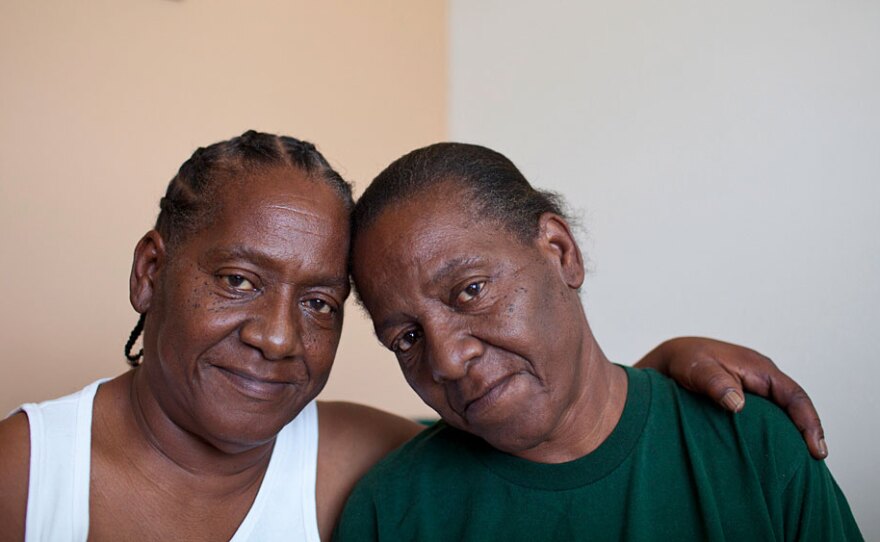When Hurricane Katrina hit New Orleans five years ago, more than 5,000 families lived in the city's public housing developments. Now, only a third of them are back in public housing. Many have found homes elsewhere.
Some former residents think the storm gave the city an excuse to get rid of some of its poorest residents. Housing officials say, on the contrary, it was a chance to improve their lives.
Almost a year after the storm, then-Housing and Urban Development Secretary Alphonso Jackson announced that the government would demolish flood-damaged public housing projects and replace them with new, mixed-income developments. He said it would bring a "renaissance" to city neighborhoods.
Many who evacuated from public housing fought those plans. They argued that developments slated for demolition could be repaired. But, eventually, the government won.
'I Don't Like My Lifestyle'
Today, Bobbie Jennings, 64, is among the first few dozen families to move back into one of the new developments. It's called Harmony Oaks and is on the site of the former C.J. Peete housing project, where Jennings lived for more than 30 years before the storm.
But she's not happy.
"In their eyesight it might be better, but in my eyesight it's not," says Jennings, a retired nursing assistant.

Don't get her wrong, she says, the new units are lovely. Jennings has a two-story townhouse, with 2 1/2 baths and a modern kitchen, which she shares with her daughter and two grandchildren. But Jennings says she's just not comfortable living there.
"People around here don't know me. They don't know my grandchildren," Jennings says. "I very seldom sit outside. [There] is nobody to talk to now."
Many of her former neighbors haven't returned, and they couldn't even if they wanted to. Only one-third of the units in the new complex are devoted to public housing. The rest will go to residents with higher incomes. The government's plan is to avoid the old days of warehousing the poor.
Jennings says she also has to pay higher rent -- and utilities, which she never had to pay before. And her twin sister, Gloria Williams, now lives around the corner on another street. She used to live right next door.
"It's harder for me," Jennings says. "I love the unit, but I don't like my lifestyle."
Mixed-Income Development
But not every former C.J. Peete resident feels the same. Jocquelyn Marshall grew up here and says there's no question Harmony Oaks is a vast improvement over the aging, crime-ridden development she fled five years ago.
Marshall now has a three-bedroom brick house with peach shutters that she shares with her son. Everything is clean and new. There's even a big outdoor pool and exercise room nearby for her to use.
I'm gonna fight until all the fight is gone out of me. But when you can't fight no more, you can't fight no more. You have to give up.
"I love my house," she says. "I love the landscaping, how it goes up a little on a hill."
Marshall, who's president of the Harmony Oaks Neighborhood Association, knows that the journey here has left lots of ill feelings and mistrust, that housing officials promised more than they could deliver, and residents were sometimes lied to and left in the dark. But she says, at some point, former residents had to decide whether to keep fighting the planned demolition or help to shape what was to be built instead.
"Many individuals, when they were relocated off the site and given vouchers to live in other cities, they started living in better conditions. They didn't want to come back to bad plumbing. They didn't want to come back to the crime," she says.
David Gilmore, who runs the Housing Authority of New Orleans, says Hurricane Katrina only hastened what was bound to happen sooner or later to the city's aging public housing stock. And he thinks it's for the best.
"Nobody in his right mind would ever build a C.J. Peete again, or any of these developments again, in the same manner in which they were built the first time," he says. "So what's the choice? The choice is then to go figure out what makes more sense."

And that, he says, is the mixed-income communities now being built, with less stigma for the poor and more opportunities for residents, like job training and counseling.
Gilmore says he understands that people are frustrated. Redevelopment takes a long time, and it could be several more years before the projects are complete. The city's housing authority has also been hampered by mismanagement and corruption. Gilmore was brought in earlier this year by HUD to turn things around.
"I think folks need to be told the straight scoop right from the outset," he says. "Yes, we're going to do this. And no, we're not going to do this. We just can't get it done."
And that includes telling public housing residents that not every one of them will get to return, that some instead will get vouchers to find other housing in New Orleans and elsewhere. In fact, that's what many former public housing residents have already done. Gilmore says that no one who qualifies for aid will be abandoned.
Sky-High Rents
Housing advocates say they're hopeful he'll be good to his word. But they're worried about a shortage of affordable units in a city where rents have gone sky high.
Laura Tuggle with Southeast Louisiana Legal Services says there's been a lot of housing help from the federal government since Katrina.
"But the demand is so huge that if you were to re-open the public housing waiting list today, I am certain that you would get thousands and thousands of more applications," she says.
For now, Bobbie Jennings says she's going to try to stick it out at Harmony Oaks.
"I'm gonna fight until all the fight is gone out of me. But when you can't fight no more, you can't fight no more. You have to give up," she says.
This month, she took a hit when her daughter got a job and her rent went up $160 a month. To help pay for it, Jennings returned the sofa set she was trying to buy on layaway for her new post-Katrina home.
Copyright 2022 NPR. To see more, visit https://www.npr.org. 9(MDAzMjM2NDYzMDEyMzc1Njk5NjAxNzY3OQ001))







